- Home
- P. T. Deutermann
Official Privilege
Official Privilege Read online
OFFICIAL PRIVILEGE by P.T. Deuterman
This is a work of fiction. Characters, military organizations, ships, and places in this novel are either the product of the author’s imagination, or, if real, or based on real entities, are used fictitiously without any intent to describe their actual conduct or character. Insofar as this book addresses military issues, policies, and history, the work represents the views of the author alone and does not necessarily represent the policies and views of the United States Department of Defense.
acknowledgments
I would like to thank my editors at St. Martin’s. Thanks are also due to the lady at the Philadelphia Medical Examiner’s office and a forensic scientist in the Georgia Bureau of Investigation who asked to remain anonymous; to Debby and Kathy and Aubrey for critical first readings; to Andy Fahy for help with the battleship layout; to the Naval History Division in the Washington Navy Yard; to the public affairs office of the Washington Metropolitan Police; and to two young army captains at Georgia Military College for help with some army organizational material. Special thanks as well to my agent, Nick Ellison, and his trusty sidekick, Liz, for their continuing encouragement.
This book is dedicated to those officers who attain flag or general officer rank in the armed forces and continue to exercise the hands-on, personally-involved style of leadership that got them their stars.
april 13, 1994
THE PHILADELPHIA NAVAL SHIPYARD
i’m not gonna let those bastards scare me, Benny thought. I know what those dumb guineas are up to, a couple of ‘em probably waiting down here in the dark for me, gonna jump outta one of these hatches and try to scare my ass. He stopped, then squinted through the scratched faceplate of the mask at the hull diagram, trying to shine his hard-hat helmet light down on the diagram and still keep an eye out in the darkened second deck passageway. Sons a bitches, screwing off up there at the air lock while I go nitrogen diving down here, doing their damn job.
Benny was nineteen, a high school graduate, and he was trying like hell to convert an intern job in Production into a full-time job in the Philadelphia Naval Shipyard.
That was probably why the ship’s supe had told him to go to the battleship and do a no-shit sounding! andsecurity tour. Those goof-offs over in Shop 72 were [ reporting everything secure, but the supe had seen i them up on the main deck, sitting around when they were supposed to be inside, going space by space through the Engineering Department. “You go do it, . Benny,” he said. “I know it’s a little spooky in there, no lights and everything, but they’ll set you up with the breathing rigs, and you go through the main holes in the Wisconsin and do the security tour right.”
Benny was doing it right, but it was more than just a little spooky down here—cold black steel, some of it five, six inches thick, creating total darkness once you went through the air lock on the main deck.
There had been a temporary lighting string hung in the overhead of the main deck’s athwartships passageway, but once you went down to the second deck, it was like total darkness, man. He had a single air-tank rig on with a full facemask, because, below the main deck, the mothballed battlewagon had been backfilled with nitrogen gas to displace all the oxygen. No oxygen, no oxidation —nothing rusted. And no oxygen meant nobody else should be down here, either—except maybe a couple of wiseasses from Shop 72, waiting to scare the new kid.
He kept walking up the passageway, looking for the hatch down to Gasoline Alley and the main engineering spaces, flicking his helmet light from side to side, careful to step over the infamous knee-knockers, those steel reinforcement frames that stuck up out of the deck every twenty feet. He was cold—he should have worn the jacket, like that guy had said. But that was the same guy who’d been talking about ghosts and the souls of dead sailors wandering the passageways, rolling his eyes, and Benny wasn’t having any of that stuff.
He finally came to an armored hatch; he stepped closer to read the brass plate on which the hatch number was engraved. Then he consulted the hull diagram again. Bingo. Down this sucker to the third deck, from which access to the fire rooms and engine rooms of the battleship could be gained. He pointed his light down the steep ladder, marveling at the four-inch-thick deck through which the hatch passed and the heavy hydraulic arms supporting the hatch. What the hell was that! He snapped his head around, but there was no peripheral vision in these damn masks.
He’d had the sense that somebody might be following him in the darkness, **skip**but if there was, he knew it had to be one of those guys, come down after him to spook him. He’d seen other breathing rigs stashed up there by the air lock. Damn riggers—he wondered how long it had been since any of them had come down here to check the main spaces.
He stepped onto the first rung of the ladder and then reached up and snapped off the helmet light. He blinked at the total darkness. He had hoped to catch a flash of light behind him in case one of the guys was back there, but there was nothing—nothing but the blackness and the sound of his breathing in the mask.
“The other place where the sun don’t friggin’ shine, man,” the rigger chief had said. “It’s a friggin’ tomb down there, man, and you’re gonna see why nobody in the shop wants to make the tour. Besides, they got all those electronic flooding alarms and shit—what do they need a guy to go down there for?”
But the ship’s supe had laid it out: “Because they’re supposed to do it once a month, go down there and physically inspect the main spaces, looking for the one thing that can spell disaster in a mothballed ship—water.
The bilges are supposed to be bone-dry, so if there’s water, there’s a goddamn leak somewhere, and that’s serious shit, because rising water can short out the flooding alarms, and then you get what the snipes call a no-shitter going, that big-ass battleship sitting there without one single swingin’ dick on board and water rising in an engine room.”
One of the mothballed heavy cruisers over in the west yard had settled right to the bottom over the period of a month, flooding out the opened steam turbines and eight boilers left opened under a dry layup.
They had had to scrap the ship.
He checked the area behind him, but there was still only blackness. If there was somebody back there, they wouldn’t be able to see him if he just stepped down the hatch, so that’s what he did, going down carefully in the complete darkness, one step at a time, gently bumping his tank on the hatch coaming and then the individual treads of the ladder. When he felt his foot reach the solid-steel deck at the bottom of the ladder, he turned around and looked back up to where the top of the ladder should be. And he waited, watching for the telltale glow of another helmet light up there. But there was still nothing, and then he remembered he had eight main spaces to get through and about fifty minutes of air left in the tank.
Screw it, he thought. They wanna screw around, let ‘em. He snapped his helmet light back on and consulted the diagram, his breathing again audible in the mask.
Start from aft and work forward. Let’s see … where the hell is aft?
This way. First space to hit was the aftermost engine room, the hatch all the way aft, port side.
Over the next half hour, he physically inspected each main engineering space, stepping through the hatch from Gasoline Alley, shining his flashlight down through the deck gratings three levels down to the bilge, checking for any glint of water. He worked his way toward the bow of the ship until he came to the last hatch, number one fire room, port side, all the way forward.
The hatches had all looked much smaller than he had expected them to be.
Be a bitch to get outta these places, some heavy shit went down in the middle of a sea battle, he thought as he worked his way forward.
Probably why they ma
de them that way—keep the guys from booking topside.
He undogged the final hatch and was surprised to see how loose the dogs were; every other compartment along Gasoline Alley had been dogged down all the way, damn near requiring three men and a small boy to move those lever arms. But this one was hand-tight.
Weird. He started to open the hatch and then stopped.
I wonder if one of the guys is in there, snuck in when I was in one of the other spaces. Gonna yell
“Boo” when I open the hatch. He toyed with the idea of pushing the lever arm down instead of up, closing it, and then faking some noise to make it sound like he was slapping a lock on it. Whoever was in there’d shit a brick. But then he would not have looked in, checked for water in the bilges. He thought about it, his breath wheezing in the mask, looked at his watch, and once again thought, Screw it. He opened the hatch.
He stopped to initial the small green logbook with the time, date, and compartment number before stepping through. He tensed, expecting a sudden movement or a noise, but there was nothing. It was just another lifeless fire room, the huge shape of the boilers and all the piping flickering in his vision as he stood on the grating above the fire room and pointed the helmet light around the space.
The fire room was huge—nearly ninety feet wide and almost as long. The immense two-story bulk of the stainless steel-clad boilers glinted in the light, surrounded by a myriad of pumps and steam lines shrouded in their white asbestos lagging. He checked his watch again—twelve minutes left. “You don’t have to go in and walk around,” the supe had said.
“Just shine your light down into the bilges. Something shines back at you, log it, then report back. You don’t have to do anything else.”
Benny shined the light straight down and saw only darkness, except—there. He saw something white, like flour—some kind of white powder in the bilges twenty feet below the platform he was standing on, over near the centerline, under IB boiler. Shit, now what? Definitely not water, but definitely abnormal. Should he log it? He looked at his watch again. Ten minutes. Screw it.
Go down there, see what this shit is, log it, and get out of here.
Taking one last quick look out into the passageway to make sure nobody was creeping up on him, he climbed down the ladder to the gratings of the upper level of the fire room, where he looked again, down through the deck gratings. Now he could see a white bag, shiny white powder all around it down in the bilges. Damn mask. Couldn’t really see shit. His breathing sounded extra loud and raspy in the mask. Slow it down, man.
Using too much air. He looked at his watch again. Nine minutes. Looked just like a big bag of flour had been dropped into the bilges under IB boiler, where it had broken open. But no water. Okay. He pointed the helmet light around until he found the ladder to the lower level at the other end of the boiler-front aisleway, then went down one more level.
He tramped across the steel deck plates to the front of IB boiler, then got down on his hands and knees and pointed the helmet light at the remains of the bag. Even with all the scratches on the mask, he could read the printing on the bag now: powder, desiccant, nstm 242-55-9010, Milspec 9710la.
FOR USE IN WATERSIDES OF MARINE PROPULSION BOILERS during dry LAYUPS only. There was some smaller print that began with the word Warning, but he couldn’t make it out through the mask. He sat back on his haunches and shivered. It was cold down here, really cold. The place felt like a burial chamber.
What the hell was a bag of desiccant powder doing in the bilges? He knew what desiccant was—he’d originally been assigned to the boilers shop before landing the intern position in Production. Desiccant powder was hygroscopic. It soaked up moisture, kept metal structures like the steam drums in a boiler bone-dry. He knew that desiccant powder bags belonged up in the steam drum. He looked up, but there wasn’t enough light to make out the upper levels of the boiler front.
Watch your time. Eight minutes. He went back up the ladder and walked over to IB’s boiler front. He examined the steam drum’s manhole, which was visible because the big asbestos pad had been removed. He frowned.
Dry layup—the steam drum should be open; each of the boilers in the other spaces had been open.
He turned around and saw that la’s steam drum was open, the manhole cover laid out on the gratings, with the two-inch-diameter bolts collected inside, the big pad hanging on a hook. He looked back at IB’s manhole cover and saw that the eight bolts were on. He felt one and found it was only hand-tight. Seriously weird.
Why was this thing bolted up? He checked his watch again. Seven minutes.
What the hell, I’ve supposedly got a fifteen-minute reserve on top of the normal stay time.
He took off his glove and began backing off all eight of the bolts. Once he had the bolts off, he pried the manhole cover, an elliptical-shaped one-inch-thick steel cover about thirty inches across and twenty-four inches high, back on its hinges. He dipped his head to shine the helmet light inside, then felt his stomach grab in shock.
“Oh Jesus. Oh Sweet Jesus,” he moaned into the mask, which promptly fogged up from his sudden exhalation.
He stumbled back away from the boiler, back away from those staring, wide eyes and the blackened, peeling features, one clawlike hand raised as if reaching for the manhole. Then he ran for the hatch, trying not to piss his pants. He took the ladder up to the entrance grating platform two steps at a time and jumped over the knee-knocker, then nearly jumped out of his skin when there was a blaze of light and a shout as two figures waved their arms and made ghost noises at him through their masks.
He knocked one of them flat on his ass and ran right for the hatch leading up to the second deck. He went up the steel ladder, through a second armored hatch, turned right, right again, down the passageway, up the ladder where the light was showing, through the athwartships passageway. He could hear the timer on his breathing rig ringing over his sobs as his pounding lungs fought for breath. He burst through the air lock and back into the blazing sunlight in a clatter.
He ripped his mask off and heard the laughter over his heaving sobs, all the old hand riggers standing around, yukking it up at the new kid getting the shit scared out of him by the foreman and his segundo, who were stepping through the air lock even now. He tried to tell them, but they were still roaring and carrying on.
A fat, grinning face stuck itself right in front of him.
“Hey, kid, how ya like the grand tour now, hunh?
Shit, look at him. He’s—shit, lookit his face, Joey, you dipshit; you went an’ scared this kid shitless!”
“Dead guy,” Benny gasped. It was all he could get out. “Dead guy.”
The rest of the guys roared anew as Joe and his helper stripped off their masks, but then the fat man saw the look in Benny’s eyes and put up his hand. “Wait a minute, wait a goddamn minute, here—hey, guys, hold it, hold it, awright?” he yelled. “Benny, what’s this shit about a dead guy? Hey, Benny, calm down. What is it, what is it, hey? Hey, Joey, the kid’s hyperventilatin’.
C’mere, c’mere.”
The gang stopped laughing and crowded around Benny as he sank down on his knees, his lungs scraping for breath, his mask dangling across his thighs. Then he threw up over the edge of the teak quarterdeck. There was a sudden stunned silence as the men backed away from the mess.
“Hey, kid, what the hell …” said Joey, covering his own nose and mouth. “It was just a little joke, okay?
Shit, you knew it was us, right?”
But Benny was shaking his head, trying to wipe his chin, his face ashen, miserable at the way his guts had betrayed him.
“Dead guy. In the boiler. Steam drum. One B boiler,” he gasped. “I swear. Jesus Christ. Saw his face.
A dead guy. A fucking mummy.”
april 1934
WASHINGTON. D. C Comdr. daniel lane collins stood behind his desk chair and stared out through the grimy, rain-streaked windows of his fourth-floor Pentagon office. Facing him was the dreary space betwe
en the slab cement walls of the E-ring and the D-ring. The rain trickled down vertical ridges in the concrete, which still showed the imprint of the pine boards used to form the Pentagon’s walls back in 1942. The sterile fluorescent lighting across the way showed the beginnings of another great Navy Monday as other Navy staff officers soundlessly shucked raincoats, made coffee, or began to sift through blooming in-boxes. He spotted that pretty, blond lieutenant commander who worked in OP-63 looking out her window, and he raised his coffee cup in a good-morning salute. But she didn’t return the gesture.
Didn’t see him, or maybe was just ignoring him.
Besides, his gesture probably constituted sexual harassment in the post-Tailhook era. He sighed.
His boss, Capt. Ronald K. Summerfield, USN, threaded his way through the cluster of gray desks to his private office in a bustle of wet plastic rain gear.
“You love it and you know it, Daniel,” the captain announced cheerily as he shook out his raincoat. Captain Summerfield, a tall, ruddy-faced four-striper of some twenty-seven years service, was the 614 shop’s branch head, in charge of Dan Collins and the one other staff officer of the NATO-Europe Plans and Policy Branch, Division of Politico-Military Policy, Directorate of Plans, Policy, and Operations, Office of the Chief of Naval Operations or code OP-614 for short.
It had taken Dan Collins several months to learn the Navy headquarter’s arcane office-coding system, but, given the mouthful presented by the organizational titles, the OP codes were a practical necessity.
“It reminds me of Newport at sea detail, Captain,” Dan replied, turning away from the window. “Only there’s no ship and no sea. It is just a job, after all. That recruiter lied.”
“They do that, recruiters,” Summerfield said while hanging up his raincoat and hat. He then fished a raunchy-looking coffee mug out of his out-basket, turning it over to dislodge any overnight transients. “So, no more adventure, hunh? At least you still have a shot at getting back to sea. Me, now, I’m all done. All I get to do these days is make lots and lots of policy here at Fort Fumble by the Sea. Jackson—where’s the goddamn coffee?”

 The Nugget
The Nugget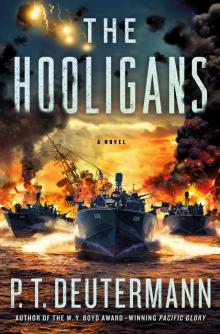 The Hooligans
The Hooligans SPIDER MOUNTAIN
SPIDER MOUNTAIN![Cold Frame [retail] Read online](http://i1.bookreadfree.com/i/03/19/cold_frame_retail_preview.jpg) Cold Frame [retail]
Cold Frame [retail] Sweepers
Sweepers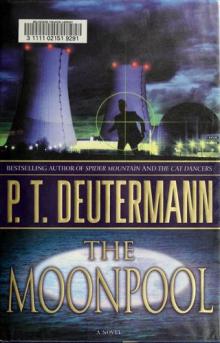 Cam - 03 - The Moonpool
Cam - 03 - The Moonpool Trial by Fire
Trial by Fire Cold Frame
Cold Frame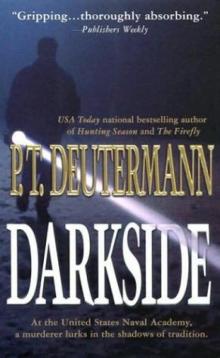 Darkside
Darkside Cam - 04 - Nightwalkers
Cam - 04 - Nightwalkers Red Swan
Red Swan The Commodore
The Commodore Hunting Season
Hunting Season The Cat Dancers
The Cat Dancers Scorpion in the Sea
Scorpion in the Sea The Edge of Honor
The Edge of Honor The Cat Dancers cr-1
The Cat Dancers cr-1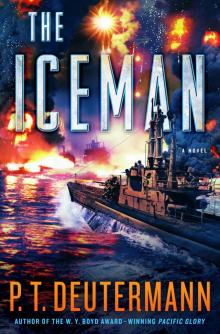 The Iceman
The Iceman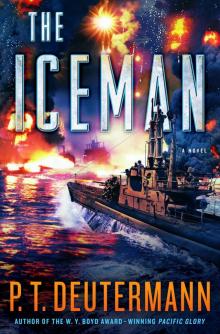 The Iceman_A Novel
The Iceman_A Novel Official Privilege
Official Privilege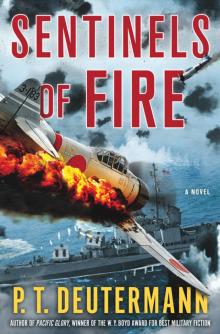 Sentinels of Fire
Sentinels of Fire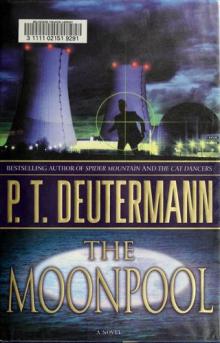 The Moonpool cr-3
The Moonpool cr-3 Nightwalkers cr-4
Nightwalkers cr-4 The Firefly
The Firefly Spider mountain cr-2
Spider mountain cr-2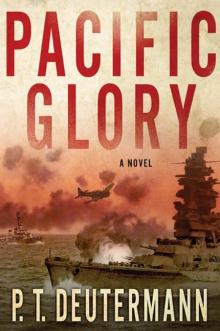 Pacific Glory
Pacific Glory The Last Man
The Last Man